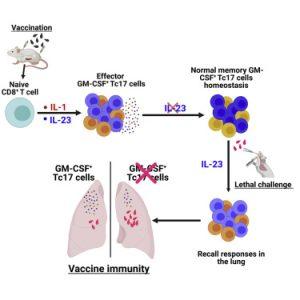Using a murine model, researchers have identified and described a type of T cell, that promotes the production of certain cytokines that play a key role in immunity against fungal pathogens (Figure 1). This study, amongst others, may aid researchers in the development of novel fungal vaccines, especially as the search for an effective and safe human fungal vaccine remains a challenging task.
In this study, the researchers showed that IL-17A+ CD8+ T cell (Tc17), which expresses GM-CSF (granulocyte-macrophage colony-stimulating factor) much like TH17 cells, plays a key role in regulating and facilitating vaccine immunity to fungal pathogen without the side effect of hyperinflammation. This highlights the important role of T cells in immunisation against bacteria, viruses, and fungi.
The Researchers were able to determine the importance of GM-CSF+ Tc17 cells for mediation of vaccine immunity. In addition, they were able to find that IL-1 and IL-23 are key role players in the function/production of GM-CSF+ Tc17 cells for vaccine immunity.
he discovery of a useful T cell subset for fungus vaccine protection in this study supports efforts to create a vaccine platform with sufficient adjuvants to potentiate such a T cell subset.
Journal article: Mudalagiriyappa, S., et al., 2022. GM-CSF+ Tc17 cells are required to bolster vaccine immunity against lethal fungal pneumonia without causing overt pathology. Cell Reports.
Summary by Stefan Botha











